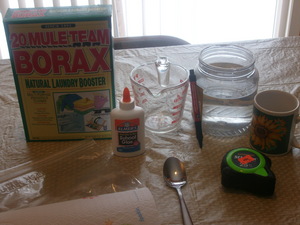Tips to make your child's next science fair project a little easier

Science fair project — supplies for making slime.
Angela Verges| Contributor
It is that time again, time to go into “super mom” mode. You begin to do more planning for the science fair than your child. What project will be a good fit for him? What supplies will I have to purchase? I have to make sure he gets everything done when it is due. Does this sound familiar?
I had to remind myself that I don’t have to do it all. I gave my son some guidelines and told him how to get started. His response was, “Can’t I just do the same project as last year? I have a different teacher.” I had to remind him that the purpose of a science project is to be creative, make explorations and learn new things.
In an effort to hold onto my sanity a little longer and make science fun, I searched for tips to get my son and myself through yet another project. PBS Parents lists a few pointers on their website on how to enjoy science alongside your child.
• You don’t have to have all of the answers to your child’s questions. Encourage your child to develop his own thinking skills.
• Listen carefully to your child. Discuss what he thinks and why he thinks that way. Ask open ended questions such as, “Why do you think the tennis ball will bounce higher than the kickball?
• Don’t immediately correct your child. If your child says something scientifically incorrect, help him discover the correct answer. For example, if he says, “heavy things sink” you can ask what things he has seen sink. You could also ask, “Are there any heavy things that you can think of that may float?”
• Model curiosity. Wonder aloud, “I wonder what will happen if we added a teaspoon of vinegar to a small cup of milk?” SIDE NOTE: this is a good way to make milk sour if a recipe calls for a spoon of sour milk (as is the case with my favorite banana bread recipe).
I have found that a science project goes more smoothly if it is one that really interests my child and not just me. An article on ehow.com indicates that a child should choose a project that is testable and within the ability of the child and not the parent. This is yet another indication that I do not have to take on the world. I can relinquish the reins and let my child put forth his best effort.
What are your suggestions for getting your child through a science fair project?
Angela Verges is a writer and mother of two. She can be reached at awritersdream41@yahoo.com.


Comments
Gardener57
Fri, Jan 21, 2011 : 2:19 p.m.
My children are all graduated from the AAPS, but two of my pet peeves are projects that require parental instruction and supervision - often no school instruction appeared to have been done and we were forced to be "involved" from start to finish, and the assigning of projects that required parents to go out and buy materials for the project in violation of Michigan state law. In order for true equity to exist, Children should have assignments that are age appropriate which means they should be able to complete them without helicopter parents' constant vigilance, rich and poor children should have the same opportunities to complete their school assignments.